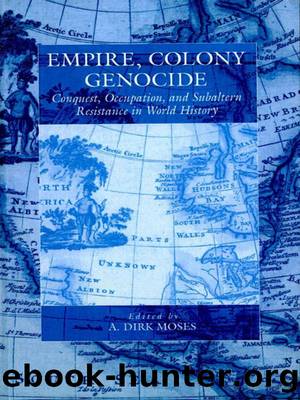Empire, Colony, Genocide (War and Genocide) by A. Dirk Moses

Author:A. Dirk Moses [A. Dirk Moses]
Language: eng
Format: epub
Publisher: Berghahn Books
Published: 2008-06-01T00:00:00+00:00
New Understandings: The Impact of World War II
From the late 1930s, changes in government policy and thinking about the place of Aboriginal people in Australia's future began to have an impact on historical scholarship. World War II, especially as knowledge and understanding grew of the Nazi campaign to exterminate the Jews, also had a profound impact on thinking about race and history. Several specialist studies on Australian Aboriginal history, all involving original research, were completed just before or during the war, though in wartime conditions they took varying amounts of time to appear in print. 36 One of these was by Clive Turnbull, a Tasmanian-born journalist working for the Melbourne Herald, whose book Black War: The Extermination of the Tasmanian Aborigines, appeared in 19 4 8. 37 So radical a break did it mark that it is worth close examination.
Black War signalled a challenge to the comfortable extinction discourse that had prevailed since the 1870s. It began: âNot, perhaps, before has a race of men been destroyed utterly within 75 years. This is the story of a race which was so destroyed, that of the aborigines of Tasmania.â 38 More clearly than anyone since Bonwick, Turnbull attributed this destruction directly to the effects of colonization. He places the blame squarely with the British authorities who made the decision to colonize the island, first as a prison and later as a place of profit: âEither object [prison or profit] might have been, and both were, fatal to the aborigines who were superfluous and, indeed, a hindrance to those achievements. Their fate was written when [Governor] King turned his thoughts toward the island as a penal settlement.â 39 Indeed, he wrote on page two: âThe extinction of the people of Van Diemen's Land was foreseen from the earliest years of the European settlement but that did not in any degree dissuade the Government from its course.â 40 Turnbull writes that while many were âappalled by the atrocities committed upon the nativesâ the policy of colonization was not abandoned. After all, he says, âthe only remedy would have been to deny to the invaders all property rights in the island.â This was not done, and instead the authorities attempted âone pious palliative after another,â to little effect, until âeventually the aborigines solved the problem in the way most convenient for all by dying.â 41
The idea of a mysterious disappearance in the wake of a meeting of two incompatible cultures was still popular in Australia, and Turnbull set out to refute it. âThese people,â he wrote, âwere not destroyed by a foreign culture. They were destroyed by arms and expatriation as part of a ruthless policy.â 42 They were destroyed ânot only by a different manner of life but by the ill-will of the usurpers of the race's land.â 43 In explanation of what he means by âpolicy,â he says: âIt was not so much that there was a general will for the extermination of the aboriginesâthough that was sometimes expressedâas that there was no general will against it.
Download
This site does not store any files on its server. We only index and link to content provided by other sites. Please contact the content providers to delete copyright contents if any and email us, we'll remove relevant links or contents immediately.
| Africa | Americas |
| Arctic & Antarctica | Asia |
| Australia & Oceania | Europe |
| Middle East | Russia |
| United States | World |
| Ancient Civilizations | Military |
| Historical Study & Educational Resources |
The Dawn of Everything by David Graeber & David Wengrow(1693)
The Bomber Mafia by Malcolm Gladwell(1620)
Facing the Mountain by Daniel James Brown(1546)
Submerged Prehistory by Benjamin Jonathan; & Clive Bonsall & Catriona Pickard & Anders Fischer(1452)
Wandering in Strange Lands by Morgan Jerkins(1419)
Tip Top by Bill James(1409)
Driving While Brown: Sheriff Joe Arpaio Versus the Latino Resistance by Terry Greene Sterling & Jude Joffe-Block(1369)
Red Roulette : An Insider's Story of Wealth, Power, Corruption, and Vengeance in Today's China (9781982156176) by Shum Desmond(1350)
Evil Geniuses: The Unmaking of America: A Recent History by Kurt Andersen(1346)
The Way of Fire and Ice: The Living Tradition of Norse Paganism by Ryan Smith(1326)
American Kompromat by Craig Unger(1307)
It Was All a Lie by Stuart Stevens;(1296)
F*cking History by The Captain(1289)
American Dreams by Unknown(1277)
Treasure Islands: Tax Havens and the Men who Stole the World by Nicholas Shaxson(1267)
Evil Geniuses by Kurt Andersen(1249)
White House Inc. by Dan Alexander(1207)
The First Conspiracy by Brad Meltzer & Josh Mensch(1167)
The Fifteen Biggest Lies about the Economy: And Everything Else the Right Doesn't Want You to Know about Taxes, Jobs, and Corporate America by Joshua Holland(1115)
